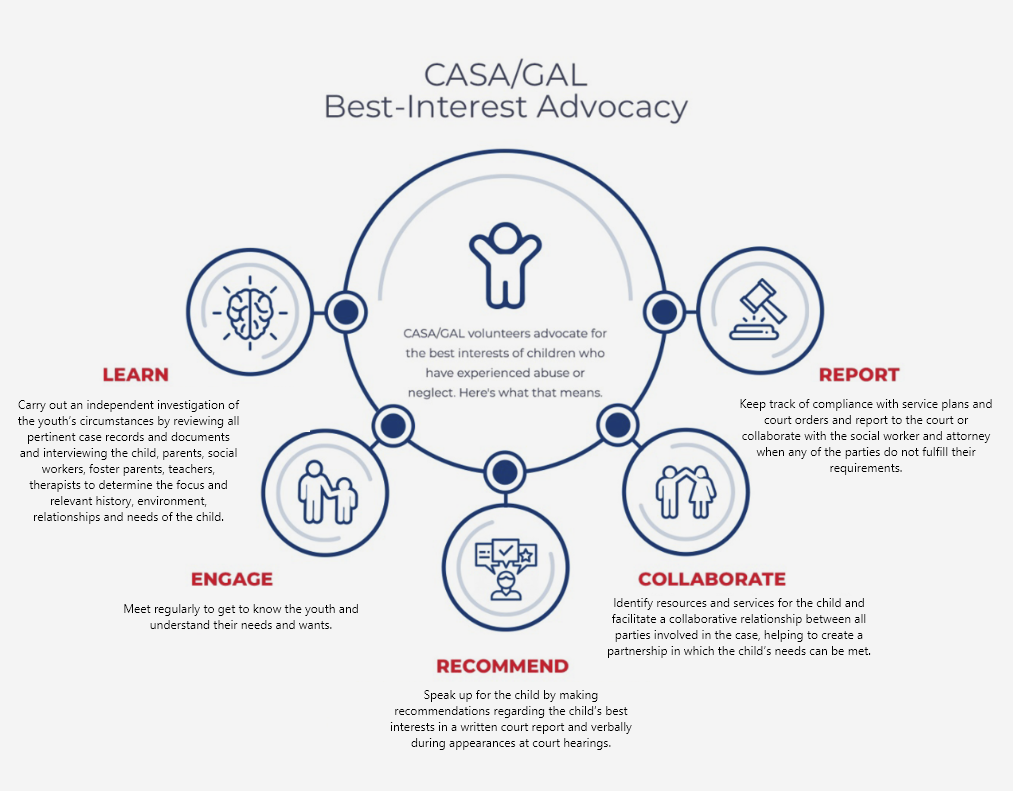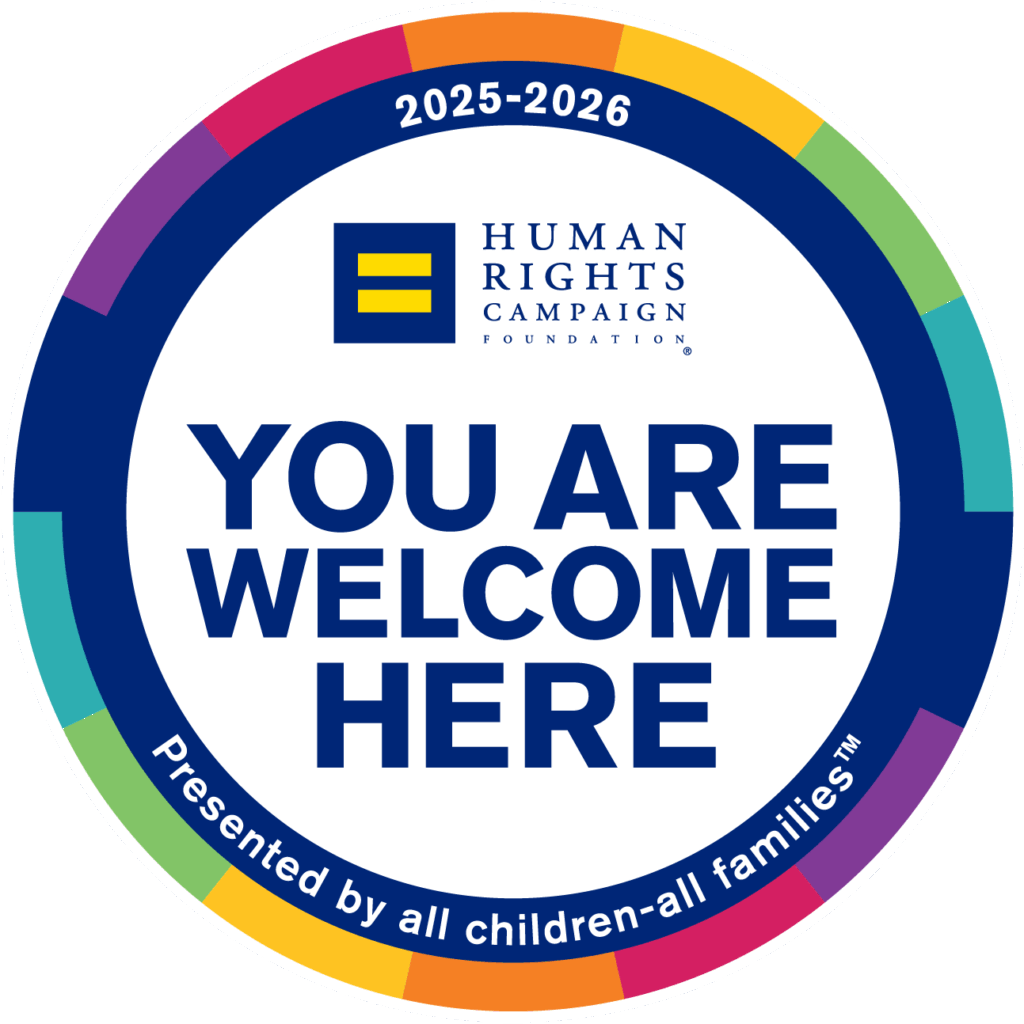CASA stands for Court Appointed Special Advocate. CASAs are volunteers of all backgrounds who make a commitment to advocate for the needs of the child or sibling group with whom they are matched. A CASA gets to know a child’s situation, communicates with professionals on the case, and makes sure the child’s needs are being met.
Over time, a CASA often becomes the most consistent person in a child’s life. At regular court hearings required for all children in foster care, our CASAs report on the children’s progress and needs, which is essential for judges to make the best decisions for their futures.
Review our requirements for becoming a CASA. Then, view the recorded Orientation Session, where you will hear from our Recruitment and Training Director. Once completed, you may proceed to the application process.
Complete an application online to become a CASA volunteer in Sacramento County. Your application needs to be submitted prior to your initial interview.
During your initial interview, you will have an opportunity to tell us about yourself and why you are interested in volunteering. In order to safely and effectively support children in foster care, we have a responsibility to ensure interested volunteers are there for the right reasons.
Our hybrid training is designed to prepare you to be a successful advocate for child. You will engage in 35 hours of in-person and online instruction covering topics like child development, dependency law and cultural agility. There is a nominal fingerprinting fee, which can be waived if needed.
After completing training, you will be matched with a Case Supervisor, a CASA Sacramento staff member who will work closely with you on the child’s case to provide support in all aspects of your CASA service.
Once you’ve complete training and passed all required background checks, you are ready to advocate. You’ll be sworn in by the Presiding Judge of the Juvenile Courts and will then be matched with a child or sibling set.

Find Out More About The
Roles And Responsibilities Of
A Casa Volunteer .
CASA Top 10 Commitment List
DEI Commitment
CASA Sacramento recognizes diversity in socioeconomic status, cultural background, gender, religion, sexual orientation, physical and mental ability, and viewpoints. It is by valuing the differences and varied strengths among us that we can best serve the children and, ultimately, the larger community. We intend not merely to state this commitment in writing, but to make it readily apparent in CASA Sacramento’s hiring practices, volunteer recruitment and training, appointments to Board of Directors, public outreach, and in our service on behalf of abused and neglected children.
CASA Sacramento fully endorses the principles and goals outlined in the National CASA diversity policy.
LGBTQ youth are over-represented in the child welfare system, and disproportionately likely to leave foster care without a permanent family. Many of these youth experience neglect, abuse, and/or abandonment specifically because of their sexual orientation or gender identity. (Source)
All Children – All Families (ACAF), a project of the Human Rights Campaign Foundation, promotes LGBTQ inclusive policies and affirming practices among child welfare agencies, and formally recognizes those agencies that are leading the field with innovative approaches to inclusion. CASA Sacramento has been recognized for achieving the Tier of Recognition: Solid Foundation for Inclusion. At this level, agencies have implemented the essential elements of LGBTQ inclusion in policies and affirming practices. Benchmarks go beyond basic non-discrimination protections to the policies and practices necessary to actively “roll out the welcome mat” to the LGBTQ community. These agencies have also assessed their practices specific to youth and parents to ensure LGBTQ inclusion and acted to make these efforts sustainable for the long-term.
To achieve this level of recognition, the core policy and practice areas in categories 1-6 must be in place:

Local LGBTQIA+ resources:
For health and wellness resources and community groups, visit the Gender Health Center or the Sacramento LGBT Community Center.
For businesses and community events, visit the Sacramento Rainbow Chamber of Commerce website or sign up for their newsletter here.
CASA Sacramento’s Diversity & Inclusion Committee was formed in June 2020 with three staff members and two CASA Volunteers to create stronger and more collaborative ways to address the systemic oppression of others based on their ethnicity, race, gender, religion, sexual orientation, gender identity and expression, country of origin, age, or disability. The Committee facilitates trainings with staff, board members, and CASA Volunteers about systemic issues that affect our youth in ways that may differ from the average Volunteer’s life experience. We strive to empower CASA Volunteers to leverage this knowledge to provide stronger, more effective advocacy for youth in the child welfare system.
Danielle Dace, Training & Recruitment Director
Dani Wogulis, Development Manager
CASA Sacramento is highly committed to diversity and a workplace environment that respects, appreciates, and values employees from all backgrounds.
CASA Sacramento is an equal employment opportunity employer. CASA Sacramento’s policy is to not discriminate against any applicant or employee based on race, religious creed, color, national origin, ancestry, physical or mental disability, medical condition, genetic information, marital status (including registered domestic partnership status), sex and gender (including pregnancy, childbirth, lactation and related medical conditions), gender identity and gender expression (including transgender individuals who are transitioning, have transitioned, or are perceived to be transitioning to the gender with which they identify), age (40 or over), sexual orientation, Civil Air Patrol status, military and veteran status, or any other basis protected by applicable federal, state, or local laws. CASA Sacramento also prohibits harassment of applicants or employees based on any of these protected categories.